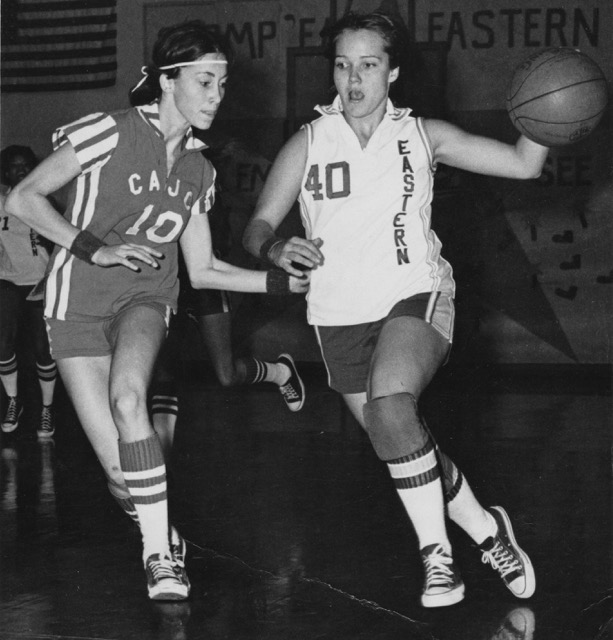The weekly game started off easy enough. I was paired with an A player, someone pleasant, not too chatty, a gal who would keep me on my toes. We stayed quiet at first, giving each other room to find our golf swings and establish a rhythm.
After several holes she asked, “Where did you play college basketball?”
I bit my lip, then answered, “Oh, I started out in a place you’ve probably never heard of, Carl Albert Junior College in eastern Oklahoma.”
She laughed. Not only had she heard of it, but knew it well. (She and her late husband had lived in the small town and now she serves on the board of trustees for the school.)
I was startled, not so much by the coincidence (I’ve learned to expect those), but by the panic that filled my throat. Old emotions rose from deep within and soon flashbacks of my freshman year of college filled my head. I felt as if I was reliving my past. And in some ways I was.
It was 1977 and I had moved away from home for the first time. The college town itself was not big, but big enough. It offered a freedom I had never experienced. And, just like many freshmen in college I made mistakes, embarrassing mistakes.
Right then we teed off on #16, an easy par 4, and my game fell apart. Hers didn’t. She took home the prize money for the day, while I struggled to stay in the game.
Later at home, I found a way to process the unbridled emotions that lingered and stayed with me. First I acknowledged the emotions, felt them for what they were, and gave them (and me) room to breathe. I chose to open the old wounds instead of shoving them back into the nethers of my psyche. I pulled out my journal and started scribbling.
Within minutes I began to calm down, to feel at peace, to understand and know that my emotions do not define me. They are like an ocean wave hitting shore, ebbing and flowing. They are like a breeze blowing by, something fragmented and brief, something ephemeral, just a passing thing. They will return, but they will go again.
Thich Nhat Hanh, a Vietnamese Buddhist monk and spiritual leader, teaches us to identity this type of experience as “habit energy”– an action or emotion we experience without intending to, something akin to an unconscious, almost instinctual response, a behavior we have learned.
One thing for certain is that these old wounds, these emotional scars will rise up and catch us off guard. It’s our job to identify them for what they are, to realize they remain nimble enough to swat us in the face with a truth we cannot ignore. That truth for me is self-love and self-forgiveness.
During this round of golf I came face to face with a part of my life that I had buried thirty-five years ago. My partner helped bring it back into view. It isn’t the winning and losing that matters to me. It is this game, this life. Living and learning, letting go, holding and releasing. And forgiving.
Sources: Hanh, Thich Nhat. Reconciliation: Healing the Inner Child. Parallax Press, Berkeley, California. 2010.


Thank you for making me aware of my own Habit Energy. I have had many of those since moving back home to Texas. Sometimes they take my breath away and I have a hard time shaking them like a dream you think about all day. I have indeed learned it is my soul dealing with things I tried to escape from in my youth. These feelings have helped me like the grown-up me and, like you, let go and forgive, mainly forgive myself!
Isn’t that a great term — habit energy? It really makes sense to me and whenever (just seconds ago, even) I feel old stuff rise up, I can now swat it away, saying, “no, I’m done with that!” I’m sure I’ll repeat that many more times each day for the rest of my life, but knowing and recognizing those moments, that brings me closer to self-love.
What a beautiful gift your golf partner gave you by pointing to a deeply held wound, so that you could focus your awareness there, allowing it to float up, expand, and release some of its hold on you.
Thank you for sharing…
The next time we played together, I thanked her. And we had a good laugh about it all. Life is magical that way, isn’t it?
You have a competitive edge in all that you do Lynda. Always trying to better your game in all aspects of your life. That’s one of the many things I love about you !
That sometimes gets me in trouble with my own wellness. Always striving. I’m trying to let go of this edge, not the easiest thing. But I keep at it.
Isn’t it amazing how our past invades our present, bringing with it fear or guilt or sorrow or even happiness? How wise of you to grapple with your experience and its meaning, giving voice to that meaning in your journal and then growing into self-forgiveness. Thank you for this reminder to let go of the “habit energy”, the negative energy that stunts us. Pernaps the AA Serenity Prayer is in order as often as needed.
Yes, it is amazing how many times our pasts recycles itself back into our present lives. And, I’m surprised each time it happens, over and over again. I suppose that as long as I’m recognizing it and moving forward, I’m doing the best I can.